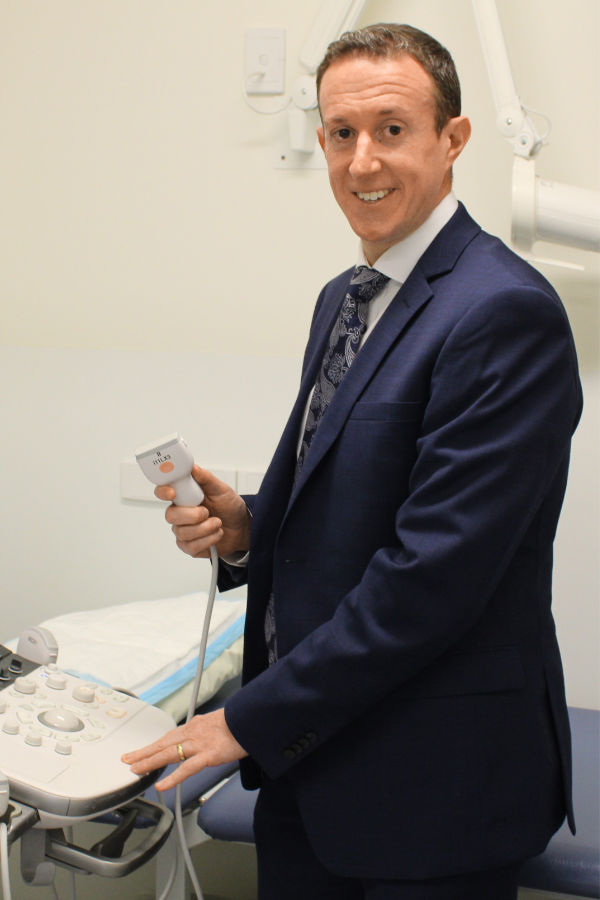Procedures

Gandel Foundation Intestinal Ultrasound Centre
Intestinal ultrasound (IUS) is a unique transabdominal ultrasound used to examine the entire intestinal tract. IUS is non-invasive and does not require bowel preparation or fasting. Patients receive their results in real time during the procedure.
Associate Professor Antony Friedman pioneered this technology in Australia. In 2012, he undertook an Intestinal Ultrasound Fellowship at the Ospedale Luigi Sacco in Milan, Italy. Following this, Antony established the Gandel Foundation Intestinal Ultrasound Centre at The Alfred, the first of its kind in Australia. Antony is the Head of the Centre and has trained more than thirty specialists in IUS from around the world. Through the ongoing generosity of the Gandel Foundation, the Centre remains the only dedicated full time service in Australia of this cutting-edge technology.
Both Antony and Natassia have regular IUS sessions at The Alfred. Patients can undergo this scan with no out-of-pocket costs.
Gastroscopy
Gastroscopy is a procedure performed in hospital by your doctor. A thin flexible instrument containing a camera is inserted into the mouth and used to examine the oesophagus, stomach and duodenum. During a gastroscopy, biopsies may be taken and lesions may be removed. A specialist anaesthetist will give you an intravenous sedative so that you will be asleep and comfortable throughout the procedure.
To prepare for a gastroscopy, you are required to fast. Instructions regarding the timing will be given to you when you book your procedure.
Colonoscopy
Colonoscopy is a procedure performed in hospital by your doctor. A thin flexible instrument containing a camera is inserted into the rectum and used to examine the colon and terminal ileum. During a colonoscopy, biopsies may be taken and lesions may be removed. A specialist anaesthetist will give you an intravenous sedative so that you will be asleep and comfortable throughout the procedure.
To prepare for a colonoscopy, you are required to drink bowel preparation solution and fast. Instructions regarding the bowel preparation products and timing will be given to you when you book your procedure.
Capsule Endoscopy
Capsule endoscopy is a procedure that is performed in hospital by your doctor or at the Melbourne Centre for Gastroenterology. It is used to examine the small bowel which cannot be accessed via gastroscopy or colonoscopy. The capsule contains a camera and transmitter and is about 25mm in length. The camera takes frequent photos which are transmitted via Bluetooth to a recording device comfortably worn on a belt around your waist. The data is downloaded for your gastroenterologist to subsequently analyse.
To prepare for capsule endoscopy, you are required to drink bowel preparation solution and fast. Instructions regarding the bowel preparation products and timing will be given to you when you book your procedure.
FibroScan®
FibroScan is a non-invasive ultrasound used to measure the fibrosis or scarring of the liver. It is performed in conjunction with an ultrasound assessment of liver architecture. Patients receive their results in real time during the procedure. FibroScan is widely accepted as the first-line assessment of liver fibrosis in many liver conditions.
Dr Natassia Tan is qualified to perform FibroScan at multiple hospitals. Patients can undergo this scan with no out-of-pocket costs.
Faecal Microbial Transplantation
Associate Professor Antony Friedman performs faecal microbial transplantation for specific gastrointestinal indications. He is a leader in this field and uses Australia’s first TGA-approved biological therapy for restoration of gut microbiota, produced by BiomeBank. The treatment is delivered via colonoscopy and patients will require a consultation with Associate Professor Antony Friedman to determine their suitability for this treatment.